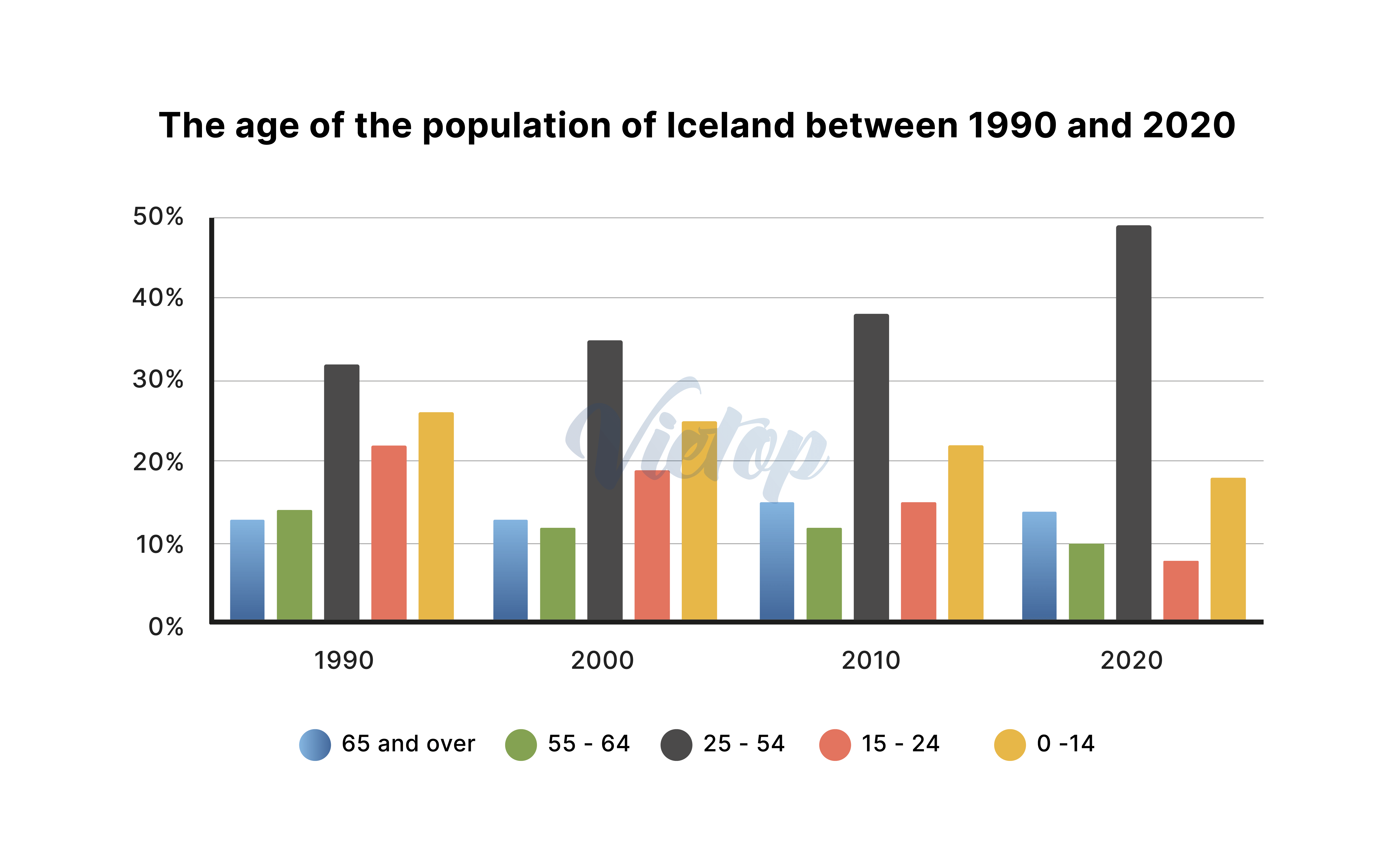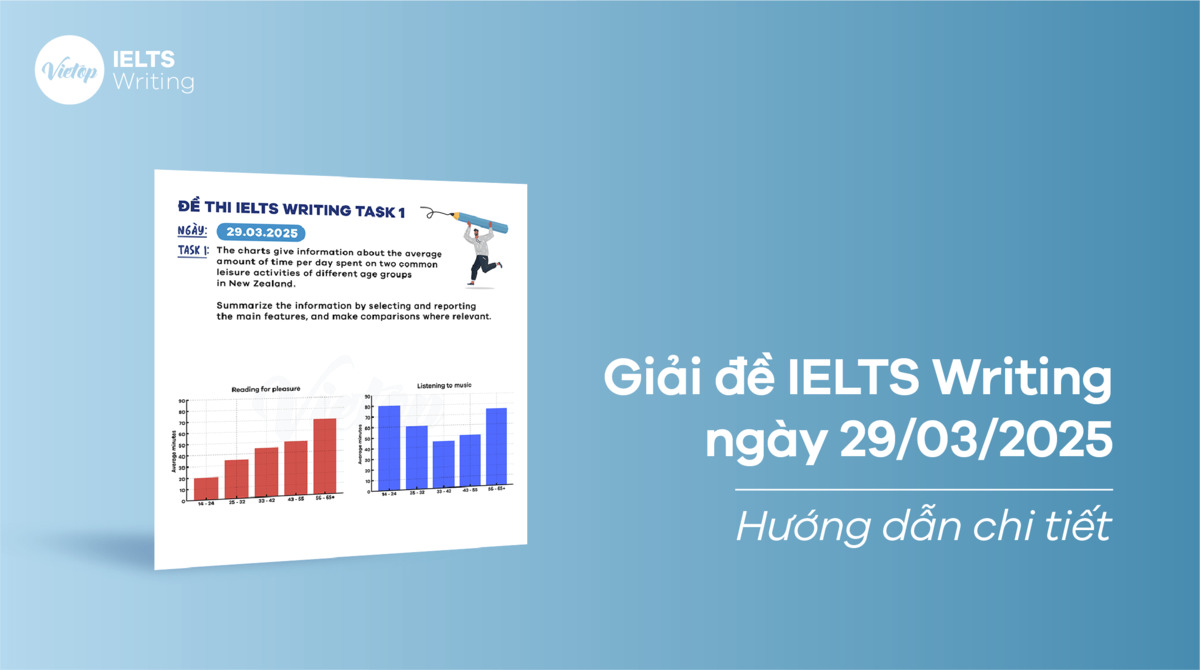IELTS Writing sample topic Population có thể được xem là tương đối khó nhằn đối với phần lớn học viên do chúng ta thật sự không có quá nhiều kiến thức cũng như lượng từ vựng tương thích với chủ đề này. Nội dung bài viết này, Vietop English sẽ giới thiệu một số từ vựng liên quan và bài viết mẫu để tham khảo về chủ đề IELTS Writing sample topic Population này nhé.
IELTS Writing sample topic Population
IELTS Writing task 1
Task 1: The graph gives information about the age of the population of Iceland between 1990 and 2020.
Summarise the information by selecting and reporting the main features, and make comparisons where relevant.

Sample
The bar chart illustrates the percentage of people living in Iceland categorized by five different age groups from 1990 to 2020.
Overall, the majority of Icelandic people fell into the 25-54 age category and this was the only age group that saw a rising trend over the period, whereas there were decreases in the two youngest age ranges. Additionally, the number of people in the older groups (from the age of 55 onwards) in this country stayed the same and generally remained the lowest throughout.
Regarding the three younger age groups, in 1990, people aged 25-54 dominated Iceland’s population, accounting for just over 30%, followed closely by people at the ages of 0-14 and 15-24, at around 25% and 22% respectively. Over the next 20 years, the 25-54 age group increased steadily before seeing a sharp growth to reach its high of just under 50% in 2020, which was significantly higher in comparison to the remaining groups. By contrast, the number of people whose age ranged from 0-14 and 15-24 experienced steady declines, eventually falling to roughly 18% and 8% in turn in 2020. Notably, in the final year, the lowest recorded figure occurred in the second youngest age category (15-24).
As for the two older age categories, both of them had the lowest figures overall. In the first 20 years, from 1990 to 2010, the percentage of 55- to 64-year-olds remained relatively stable at approximately 12%, with a subsequent marginal decline to 10% in 2020. An almost similar pattern was witnessed among people aged 65 and over, whose data consistently stayed constant at around 12% throughout, with a peak of close to 15% in 2010.
Phân tích
Thân bài 1 ta viết về nhóm tuổi 0-14, 15-24, 25-54 vì có dữ liệu cao hơn và có xu hướng trái ngược nhau
Thân bài 2 ta viết về nhóm tuổi 55-64, 65 and over vì có dữ liệu thấp và duy trì tương đối ổn định
Overview:
- Nhóm tuổi 15-24 cao nhất xuyên suốt thời kỳ và có khuynh hướng tăng, trong khi đó 2 nhóm tuổi trẻ nhất có khuynh hướng giảm.
- 2 nhóm tuổi lớn nhất duy trì ổn định và có dữ liệu thấp nhất cả thời kỳ.
Xem thêm:
IELTS Writing sample topic Workforce
IELTS Writing task 2
Task 2: In many societies in the world, the population is aging rapidly and this is leading to an unsustainable increase in the cost of public healthcare. A nation’s population should pay for their healthcare provision in the future. To what extent do you agree or disagree?
Sample
Many countries around the world are experiencing a considerable increase in the number of elderly people, which results in the escalating costs of public healthcare services. It is believed that in the upcoming years, access to these services should be paid for by the public. While there may be valid points supporting this perspective, I disagree with this school of thought for several reasons.
On the one hand, there are sound reasons to argue that the citizens of a nation should spend their own money on healthcare provision. This is predicated on the assumption that when patients pay money by themselves, they tend to pay more attention to protecting their health and preventing diseases by adopting healthier lifestyle choices.
In addition, if governments were to cover all of their residents’ healthcare costs, this could impose an enormous amount of pressure on them as more money might need to be taken from other areas, leading to insufficient funds for education, infrastructure and economy, for example, and accordingly affecting the development of a country. Lastly, the elderly, who are at a retirement age, are eligible to receive pensions, which could be used to spend on their own healthcare.
On the other hand, I believe that healthcare services should be financed by the government. Firstly, it would be an immense burden for individuals to shoulder the costs on their own, especially those related to the treatment of chronic or severe conditions. This might further increase the gap between the rich and the poor, which means that wealthier individuals could afford better healthcare, while those with lower income might struggle to meet their healthcare needs.
Secondly, we are to pay for personal income taxes on a monthly basis, and thus it is reasonable for the citizens of a country to expect the coverage of healthcare costs by the government. Thirdly, it is the fundamental responsibility of every government to ensure the well-being of its residents, which is widely believed to be a key indicator of a country’s success, besides other factors such as economy and education.
In conclusion, while it is understandable why the population of a nation should have access to healthcare services at their own expense, I am of the opinion that the government should take responsibility for this.
Bạn muốn bứt phá 0.5 – 1.0 band score IELTS chỉ trong 8 tuần? Khóa luyện IELTS Cấp tốc tại Vietop với đội ngũ giáo viên IELTS 8.0+ sẽ giúp bạn chinh phục band điểm mục tiêu. Với chương trình học tinh gọn, đảm bảo khả năng tư duy & sử dụng ngôn ngữ linh hoạt, giúp rút ngắn 1/2 thời gian đạt điểm IELTS.
Xem thêm:
Cách viết IELTS Writing Task 1 từ A – Z cho người mới bắt đầu
Những mẫu câu và cụm từ “ăn điểm” trong IELTS Writing Task 2
Cách tính điểm IELTS Writing chuẩn nhất và tiêu chí chấm điểm 2023
Vocabulary
- Escalating (adj): leo thang (giá cả)
- Cover (v): chi trả → coverage (n)
- Impose an enormous amount of pressure on: đặt nhiều áp lực lên
- Insufficient (adj): không đủ
- Be eligible to do sth (adj): có quyền được làm gì đó
- Chronic (ạdj): mãn tính
- Fundamental (adj): căn bản
- Indicator (n): yếu tổ chỉ ra
- At one’s own expense: tự mình trả chi phí
Phân tích
Quan điểm chung: Không đồng tính
Thân bài 1: Cá nhân nên chi trả
- Khi tự mình trả tiền, chúng ta quan tâm đến sức khoẻ nhiều hơn
- Nếu cá nhân không chi trả, chính phủ chịu trách nhiệm, và điều này đặt áp lực lên nguồn quỹ chính phủ
- Người lớn tuổi sẽ nhận được lương hưu
Thân bài 2: Chính phủ nên chi trả
- Không phải cá nhân nào cũng có khả năng chi trả, đặc biệt bệnh mãn tính/nghiêm trọng → tăng khoảng cách giàu nghèo xã hội
- Chúng ta đều trả thuế, và tiền thuế đó nên dùng để chi trả cho chăm sóc sức khoẻ
- Đảm bảo sự hạnh phúc/khoẻ mạnh là nhiệm vụ căn bản của mỗi chính phủ
Xem ngay: Tổng hợp đề thi IELTS Writing 2023 kèm bài mẫu chi tiết
Thông qua bài viết chắc hẳn các bạn đã có cho mình thêm những kinh nghiệm và cách hoàn thiện IELTS Writing sample topic Population. Nếu các bạn có thắc mắc hoặc có những đề tài thú vị khác thì có liên hệ với Vietop nhé, Vietop English sẽ luôn cố gắng dễ hỗ trợ bạn tốt nhất.
Xem ngay: Khóa học IELTS Cấp Tốc – Cam kết tăng ít nhất 0.5 – 1.0 band score SAU 1 THÁNG HỌC

![[ACE THE TEST] Giải đề IELTS Writing ngày 27/01/2026](https://vietop.edu.vn/wp-content/uploads/2026/01/thumbnail-giai-de-ielts-writing-ngay-27-01-2026.jpg)

![[ACE THE TEST] Giải đề IELTS Writing ngày 07/04/2025](https://vietop.edu.vn/wp-content/uploads/2025/04/giai-de-ielts-writing-ngay-07-04-2025.png)

![[ACE THE TEST] Giải đề IELTS Writing ngày 15/03/2025](https://vietop.edu.vn/wp-content/uploads/2025/03/giai-de-ielts-writing-ngay-15-03-2025.jpg)
![[ACE THE TEST] Giải đề IELTS Writing ngày 22/03/2025](https://vietop.edu.vn/wp-content/uploads/2025/03/giai-de-ielts-writing-ngay-22-03-2025.jpg)
![[ACE THE TEST] Giải đề IELTS Writing ngày 08/03/2025](https://vietop.edu.vn/wp-content/uploads/2025/03/giai-de-ielts-writing-ngay-08-03-2025.jpg)
![[ACE THE TEST] Giải đề IELTS Writing ngày 06/03/2025](https://vietop.edu.vn/wp-content/uploads/2025/03/giai-de-ielts-writing-ngay-06-03-2025.jpg)
